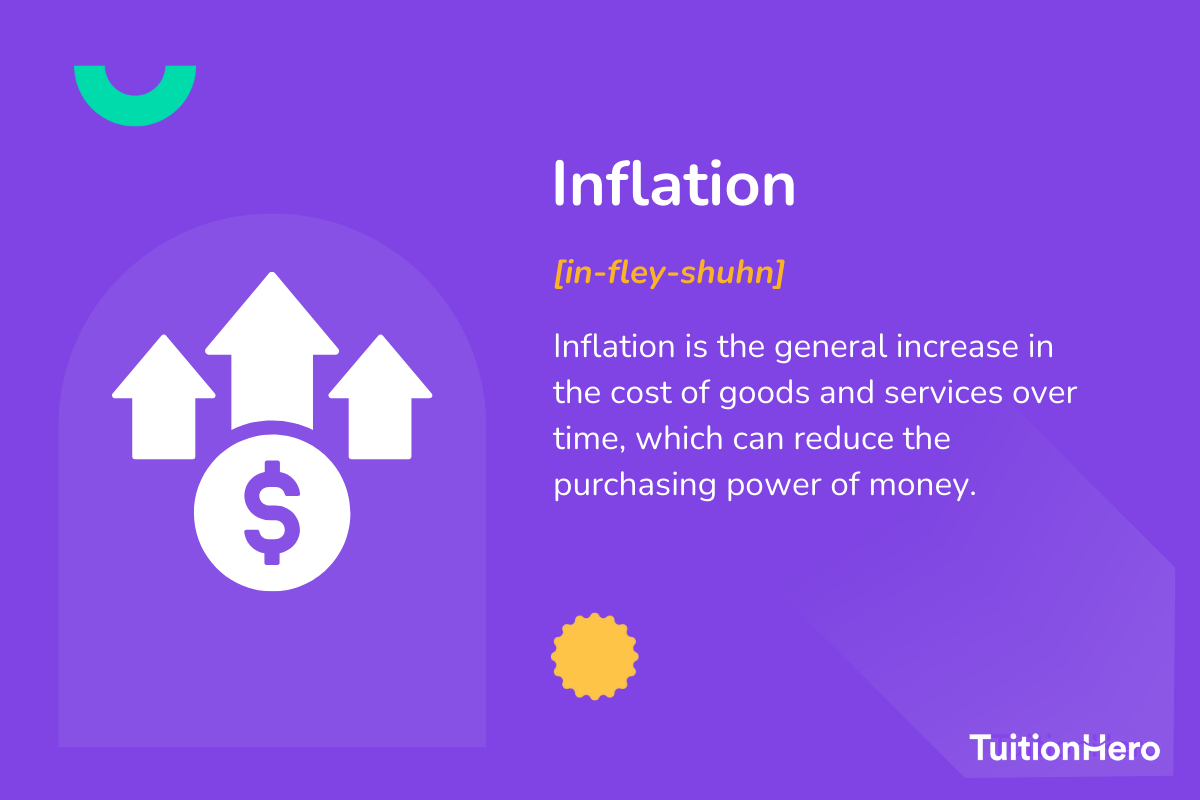Advertiser Disclosure
Last update: December 30, 2024
6 minutes read
What is Inflation?
Ever wondered how inflation affects your wallet and future plans? Learn the basics and navigate its effects with ease.

By Derick Rodriguez, Associate Editor
Edited by Brian Flaherty, B.A. Economics
Learn more about our editorial standards



By Derick Rodriguez, Associate Editor
Edited by Brian Flaherty, B.A. Economics
Learn more about our editorial standards
Inflation is a key topic for discussions in everyday places like coffee shops and classrooms. This guide will break down the causes of inflation, and its effects on your money, and provide practical tips for managing the associated challenges.

Key takeaways
- Inflation decreases the purchasing power of money, affecting how you manage student loans
- Refinancing student loans during inflation could save you money in the long run
- Keeping up with federal aid and scholarship changes for inflation can benefit you
What is inflation?
Inflation is an economic term that describes the increase in prices over a period of time. When inflation happens, each unit of currency buys fewer goods and services; essentially, the purchasing power of money decreases.
This is a crucial concept for everyone, from consumers to investors and policymakers, to understand since it affects our daily lives and long-term financial planning. Inflation is measured by looking at the change in price for a consistent basket of goods and services over time. This basket might include items like groceries, transportation, and housing.

One of the most popular baskets is known as the Consumer Price Index (CPI), which economists, politicians, and markets watch closely. A steady, moderate rise in the CPI is usually seen as a sign of a healthy economy.
High or unpredictable inflation, however, isn’t good because it causes uncertainty and stops people from investing. On the other hand, deflation, when prices generally go down, is also bad. It makes people wait to buy things, thinking prices will drop more, and that slows down the economy.
Here's how inflation affects different aspects of the economy:
- Decreases purchasing power: As prices rise, each dollar you hold buys a smaller percentage of a good or service.
- Influences interest rates: Central banks may raise interest rates to curb high inflation, affecting loan and mortgage rates.
- Affects savings and investments: Inflation can decrease the real value of savings unless these are invested in interest-bearing or inflation-protected assets.
For students and borrowers, assessing how inflation might affect your loan repayments and looking into options like refinancing student loans could provide some financial relief and flexibility.
Let's take a closer look at inflation and how it affects things like student loans and the economy. We want to understand how inflation works and its effect on different parts of our finances and the overall economy.

TuitionHero Tip
Understanding inflation is important for planning, whether it’s for everyday spending or managing long-term debts.
How inflation affects student loans
Inflation doesn't just raise the price of your morning coffee; it also affects the real cost of your student loans. Over time, if wages don’t keep pace with inflation, borrowers might find it more challenging to meet their repayment obligations.
- Interest rates matter: The interest rate on your student loans might seem manageable now, but rate hikes in response to inflation can increase payments on variable-rate loans.
- Wage growth is key: Salary increments that don’t beat inflation rates essentially mean you’re earning less over time, making it harder to repay loans.
To avoid any potential problems, understanding what discretionary income means for income-driven repayment plans could be a beneficial step.
Paradoxically, however, inflation can also be a good thing for student loan borrowers. Let’s say you’re planning on repaying $10K a few years from now. If inflation is higher than expected, then $10K in the future is now worth less, since the purchasing power of money has decreased.
This idea, sometimes called “inflation-induced debt destruction,” can make it easier to manage debt balances - but only if your wage growth keeps pace with overall inflation levels.
Federal initiatives and inflation
When prices go up, the government may introduce plans to help people who borrow money. For example, learning about how Biden's student loan forgiveness program works and how views on inflation affect policies can be helpful.
- Policy reactions: Economic policies, including interest rate adjustments, can have direct implications for student loan interest rates.
- Forgiveness and relief programs: Stay informed about eligibility for student loan forgiveness and how these programs are adjusting to inflation trends.
Strategies to combat inflation’s effect
There are strategies you can use to lessen inflation’s potential negative effects on your student loans and overall financial health.
- Refinancing: Locking in a lower interest rate through refinancing your student loans may reduce the cost over the loan’s life.
- Budgeting: Adjusting your budget to account for inflation and prioritizing loan repayments can help manage the burden.
Using resources available through platforms like TuitionHero, from understanding what a Direct Loan is to navigating FAFSA applications, can help you a lot.
Compare private student loans now
TuitionHero simplifies your student loan decision, with multiple top loans side-by-side.
Compare Rates
Dos and don’ts of managing student loans during inflation
When prices go up, it's important to be smart about dealing with student loans. What you decide can either make things better or worse because of the higher prices. Here's an easy guide to handling your student loans when prices are rising.
Do
Do consider refinancing your loans at a lower interest rate.
Do keep up with regular payments to avoid penalty fees.
Do explore income-driven repayment plans.
Do stay informed about federal relief programs and eligibility.
Don't
Don’t ignore the terms and conditions of your loan agreement.
Don’t skip payments without exploring deferment or forbearance options.
Don’t neglect to update your budget to consider inflation.
Don’t overlook opportunities for loan forgiveness or discharge.
Advantages and disadvantages of refinancing student loans during inflation
Refinancing student loans is a smart choice, especially when prices are going up a lot. It can mean you pay less interest and have smaller monthly payments. But, there are also some not-so-good things about it, so you should think about everything before deciding.
- Lower interest rates mean you could save a substantial amount on your overall loan cost.
- Consolidation of multiple loans into one can simplify payments.
- Potential for lower monthly payments to improve your budget.
- Losing federal loan benefits, like forgiveness programs and income-driven repayment plans.
- Required qualifications for refinancing might exclude some borrowers based on credit score or income.
- Possibility of extending the loan term, which could mean paying more in interest over time.

Why trust TuitionHero
At TuitionHero, we help students and parents with college finances. We connect you with lenders for loans and refinancing. We help with scholarships, FAFSA, and student-friendly credit cards. Our goal is to make handling your college finances easier, so you can make informed choices.
Frequently asked questions (FAQ)
Inflation can affect how much financial aid you get from FAFSA. It works like this: when inflation makes your family's wealth seem higher on paper, it might look like you don't need as much aid. But if your real purchasing power hasn't gone up, you might end up with less aid than you actually need.
Yes! Some scholarships increase the amount they give over time to keep up with rising prices. TuitionHero helps you find these scholarships and others, making it simpler for you to get financial help that keeps up with changes in the economy.
If you change your student loans to a lower interest rate, it can help you save money. It makes your overall loan cost less, and you might pay less each month. This way, you have more money in your budget to deal with the increasing cost of living.
Final thoughts
When it comes to knowing about how prices go up and its impact on paying for college, it's important for students and parents to know and adjust to financial changes. At TuitionHero, we're here to help you with any financial choices for your education, like picking the best loans and finding scholarships.
Keep in mind that knowing what's going on and looking at all your choices can lessen the effect of price increases on your college finance plan. Use the resources and tools we provide to make smarter choices.
Source
Author

Derick Rodriguez
Derick Rodriguez is a seasoned editor and digital marketing strategist specializing in demystifying college finance. With over half a decade of experience in the digital realm, Derick has honed a unique skill set that bridges the gap between complex financial concepts and accessible, user-friendly communication. His approach is deeply rooted in leveraging personal experiences and insights to illuminate the nuances of college finance, making it more approachable for students and families.
Editor

Brian Flaherty
Brian is a graduate of the University of Virginia where he earned a B.A. in Economics. After graduation, Brian spent four years working at a wealth management firm advising high-net-worth investors and institutions. During his time there, he passed the rigorous Series 65 exam and rose to a high-level strategy position.
At TuitionHero, we're not just passionate about our work - we take immense pride in it. Our dedicated team of writers diligently follows strict editorial standards, ensuring that every piece of content we publish is accurate, current, and highly valuable. We don't just strive for quality; we aim for excellence.
Related posts
While you're at it, here are some other college finance-related blog posts you might be interested in.
Shop and compare student financing options - 100% free!

Always free, always fast
TuitionHero is 100% free to use. Here, you can instantly view and compare multiple top lenders side-by-side.

Won’t affect credit score
Don’t worry – checking your rates with TuitionHero never impacts your credit score!

Safe and secure
We take your information's security seriously. We apply industry best practices to ensure your data is safe.
Finished scrolling? Start saving & find your private student loan rate today





